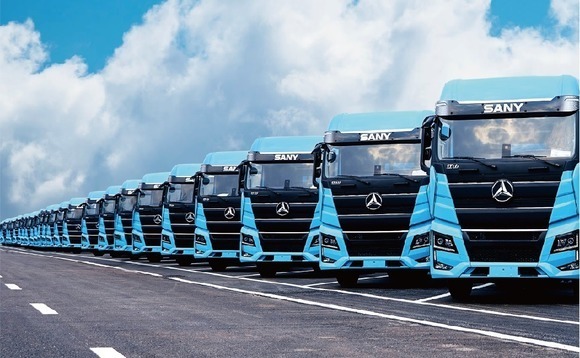
Hidden Hill joins $145m round for China's Sany Heavy Truck

Sany Heavy Truck, a subsidiary of Chinese heavy equipment manufacturer Sany Heavy Industry focused on developing new energy trucks, has raised nearly CNY 1bn (USD 145m) in Series A funding.
The round was led by Hidden Hill Capital, a private equity arm of local warehouse operator turned logistics and infrastructure investment manager GLP, China Merchants Capital, and CMG-SDIC Capital. Additional contributions came from the likes of Rosefinch and Huaxu Fund Management.
Sany Heavy Industry entered the heavy-duty trucking space in 2017, simultaneously working on fuel-heavy trucks and new energy-heavy trucks. Sany Heavy Truck claims to have developed and released three generations of products, achieving an iteration speed that far outstrips the industry average of four to eight years.
The new-generation Jianghshan fuel heavy truck employed technologies such as intelligent torque control and cruise control to deliver energy savings of more than 5%. This year, a hybrid model will be introduced with energy savings above 15%. Lithium battery heavy trucks are currently under development, while the first hydrogen-powered heavy truck was released in June 2021.
It also rolled out China's first electric tractor in Tangshan, Hebei province, and went on to receive orders from more than 20 local logistics companies and construction materials manufacturers.
The Series A funding announcement coincided with the launch of 13 electric tractor product lines under the Jiangshan SE series, including the world's largest heavy truck with battery-swapping functionality and the mass-produced charging vehicle with the largest battery capacity and a cruising range of more than 320 kilometres.
Sany Heavy Truck has collaborated with various partners on application scenarios for new energy-heavy trucks, transporting everything from steel to sand. In addition, the company also road-tested its electric heavy trucks in more than 10 different road conditions, from extreme cold to extreme heat, to ensure battery life endurance.
The company claims to have invested heavily in battery technology. In the most recent iteration, released last year, battery weight was reduced by half a tonne, volume was reduced by one-third, energy density increased 20%, and battery life in winter conditions rose fourfold.
In a statement, Sany Heavy Truck highlighted the importance of new energy trucks from an emissions perspective. It noted that heavy trucks, with their high fuel consumption and high mileage, account for 41% of carbon emissions from global road freight. In 2021, sales of new energy heavy trucks in China reached 10,000 units, up 300% year-on-year. The 2022 total was expected to hit 22,000 units.
Growth is projected to remain strong given strong policy support for emissions reduction, expansion of battery charging and swapping infrastructure, and improvements in energy replenishment efficiency.
Autonomous driving is another focus area. Sany Heavy Truck flagged up the rising cost of labour in heavy-duty trucking and the increasing scarcity of drivers. In harsh working environments such as remote mining projects, labour costs are twice the standard rate.
The company is working with partners on level-four (L4) autonomous driving solutions, where human override is still an option, but the vehicle is fully autonomous in certain environments. Last September, it delivered its first batch of L4-compatible wire control chassis. It also completed the world's first L4 road test for a 5G electric heavy truck.
Autonomous trucking appeals to investors and entrepreneurs because of its large addressable market, the ease of navigating highways versus city streets, and the fact that there are fewer concerns around driver or passenger safety when transporting goods. Three specialist truck players, TuSimple, Plus, and Inceptio have raised substantial private funding.
TuSimple listed in the US in 2021 but has since been beset by internal disputes. Founder Xiaodi Hou was removed as CEO following the launch of investigations by US regulators into an irregular relationship between the company and China-based Hydron. Hou hit back by teaming up with co-founder Mo Chen to oust the other board members and appoint new ones.
Hidden Hill has a longstanding relationship with Inceptio, which spun out from G7, an internet-of-things fleet management platform and one of the firm's earliest investments. It incubated Inceptio, working in tandem with Nio Capital, an investment firm established by the founder of electric vehicle (EV) manufacturer Nio, and connected the company with original equipment manufacturers (OEMs).
Latest News
Asian GPs slow implementation of ESG policies - survey
Asia-based private equity firms are assigning more dedicated resources to environment, social, and governance (ESG) programmes, but policy changes have slowed in the past 12 months, in part due to concerns raised internally and by LPs, according to a...
Singapore fintech start-up LXA gets $10m seed round
New Enterprise Associates (NEA) has led a USD 10m seed round for Singapore’s LXA, a financial technology start-up launched by a former Asia senior executive at The Blackstone Group.
India's InCred announces $60m round, claims unicorn status
Indian non-bank lender InCred Financial Services said it has received INR 5bn (USD 60m) at a valuation of at least USD 1bn from unnamed investors including “a global private equity fund.”
Insight leads $50m round for Australia's Roller
Insight Partners has led a USD 50m round for Australia’s Roller, a venue management software provider specializing in family fun parks.








